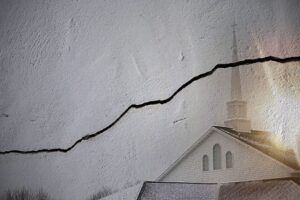Among Christian, deconstruction, reconstruction, and progressive faith circles lately is this idea of church trauma. We often think of church trauma as being something big. Many people, for example, have experienced physical or sexual abuse at the hands of religious leaders, either ordained or lay leaders. A lot of women report being told not to talk about the abuse to “save the reputation of the man” who abused them. There are also numerous instances of people being emotionally and spiritually abused by the church and her representatives.
All this talk of church trauma has made me reflect back on my life and the mess I thought, believed, and experienced.
I was never physically or sexually abused at church at any time in my faith journey. But there was some trauma.

My first church wasn’t horrible. The people were incredibly loving. It was a small, country Southern Baptist church. Let’s face it, though. In the 80s, pretty much all White Baptist churches in the South were Southern Baptist or Freewill Baptist and those that weren’t, we didn’t talk about.
Know what else we had in the 80s? Premillennial pretribulation dispensationalism cozied up with the RAPTURE. We had Jack Van Impe and his Barbie-doll wife (only Barbie looks more real, bless her heart) talking about the headlines and how they are fulfilling prophecy right in front of us! We had David Jeremiah warning us about all the earthly things being satanic and leading people away from Jesus. We had songs like “I Wish We’d All Been Ready” that talked about how horrible things were since the antichrist ushered in the tribulation and how we needed to get ourselves ready and make sure everyone else was ready, too. Edgar Whisenant calculated that Jesus would return between September 11th and 13th in 1988–the fortieth anniversary of Israel becoming an independent nation–and when we were still here on the 14th, we got anxious (until it was publicized that Whisenant may have made a mistake in his calculations). Yet, we still read the passages where Jesus says no one knows the time and date, not even him, but only God. No one else (besides me, of course) questioned how this guy could be so sure of the date range for the Rapture when not even the Son of God himself had those deets. But we were taught not to question our leaders. Asking questions was an indication of not having enough faith. (Whisenant would go on to predict the return of Christ to happen in 1989, 1993, and 1994. Smart-ass me surmised one of those times that even if Jesus were planning on coming back one of those predicted dates, he’d intentionally stall just to prove this guy wrong.)
We were good, though. We’d said the magic words and been baptized and God was cool with us. I even participated in a play that one of our youth leaders wrote that, um, impressed upon people the importance of getting right with God. More like, it scared them into believing with the threat of hell. That play was popular; we went around to several area churches and performed it. (I was one of the girls who got sent to “everlasting fire, prepared for the devil and his angels.”)
Yet, over against all this “You’re a child of God” and “You have eternal life” were the very real messages of “You’re a sinner” and “If you stray off the path then maybe you don’t really have God in your heart (and hence, won’t get into Heaven).”
It’d only be a few years later that a new preacher would come in to the church and almost split it. This preacher made things uncomfortable for our family, especially my dad. (Guess he figured that Mom and I, being women, were not significant enough to mess with.) I was in college, anyway, so it was as good a time as any to separate myself from that church. After all, this new preacher was backed by the old diaconate who had known and presumably loved my dad and us for years.
I visited churches, some once, some for months, and everywhere in between. When I was in graduate school and was living full-time in my own apartment in the university town where I was studying, I became active about looking for and finding a new church home. It was a good one. My husband would later be baptized there, and we got married there. We’ve visited it a few times through the years.
After graduation and marriage, my husband’s job necessitated that we move away from that area. We made the drive for a couple of months or so. I’d been in the choir and had really enjoyed that, but with the commute, showing up for choir practice wasn’t practical. Eventually we realized we were too far away from church truly to be a part of the parish so we started looking for a new church.
Let’s converse! Do you remember or have you dealt with end times-related church trauma? What are you doing or have you done to heal from that trauma? Respond in the comments.
